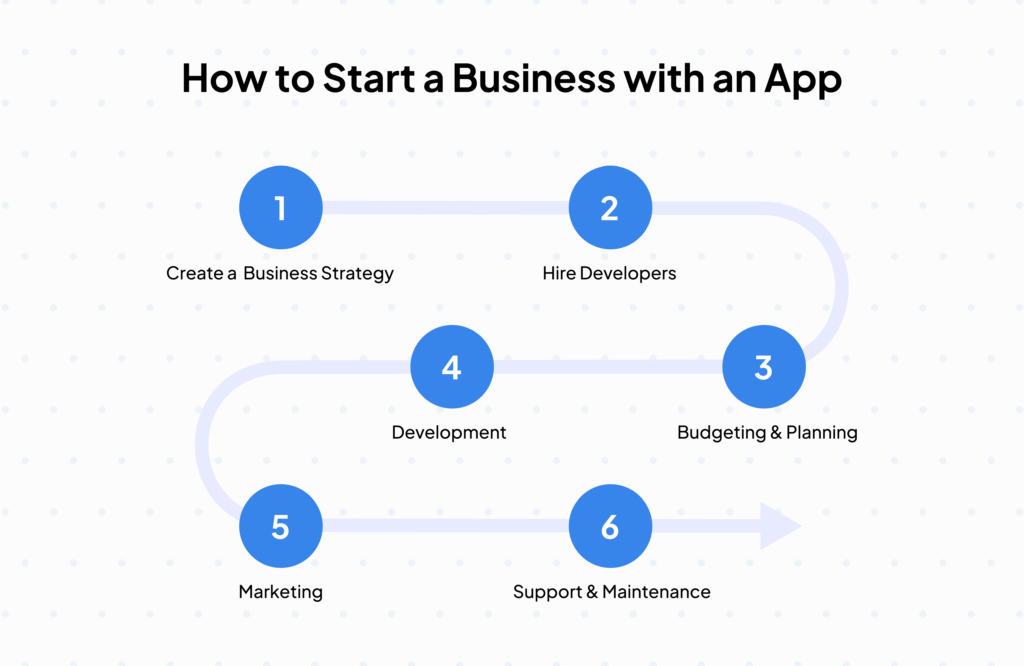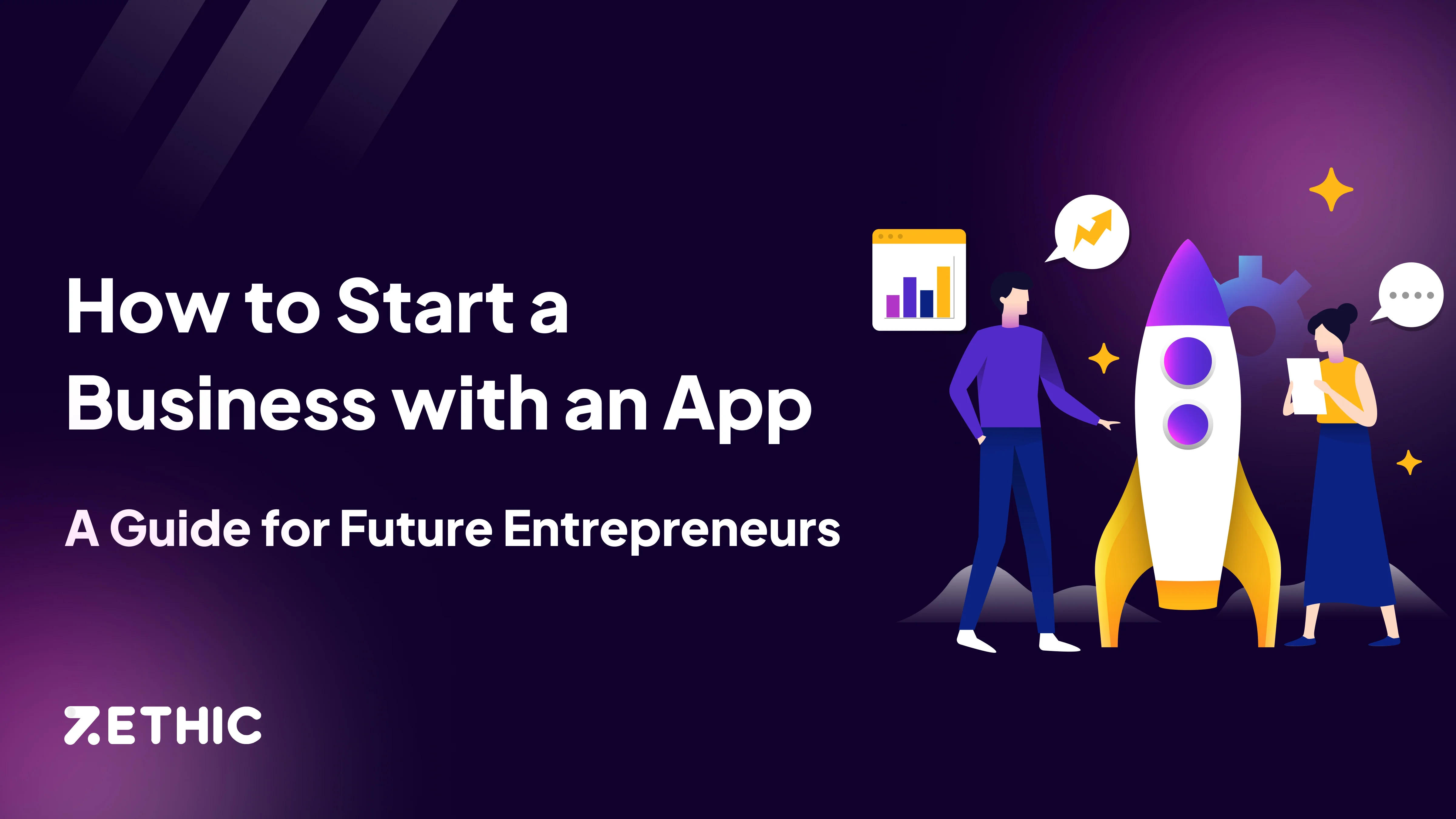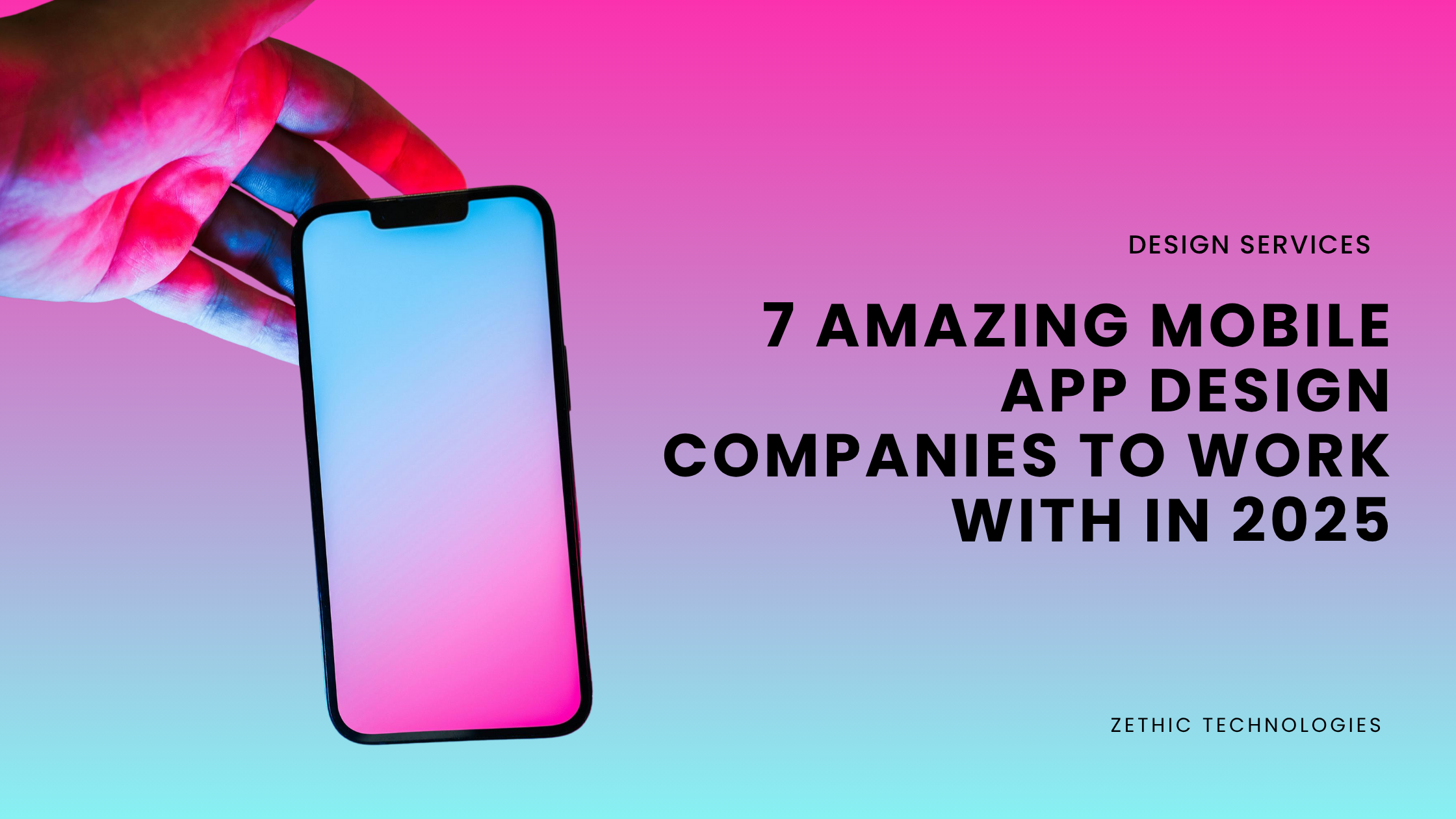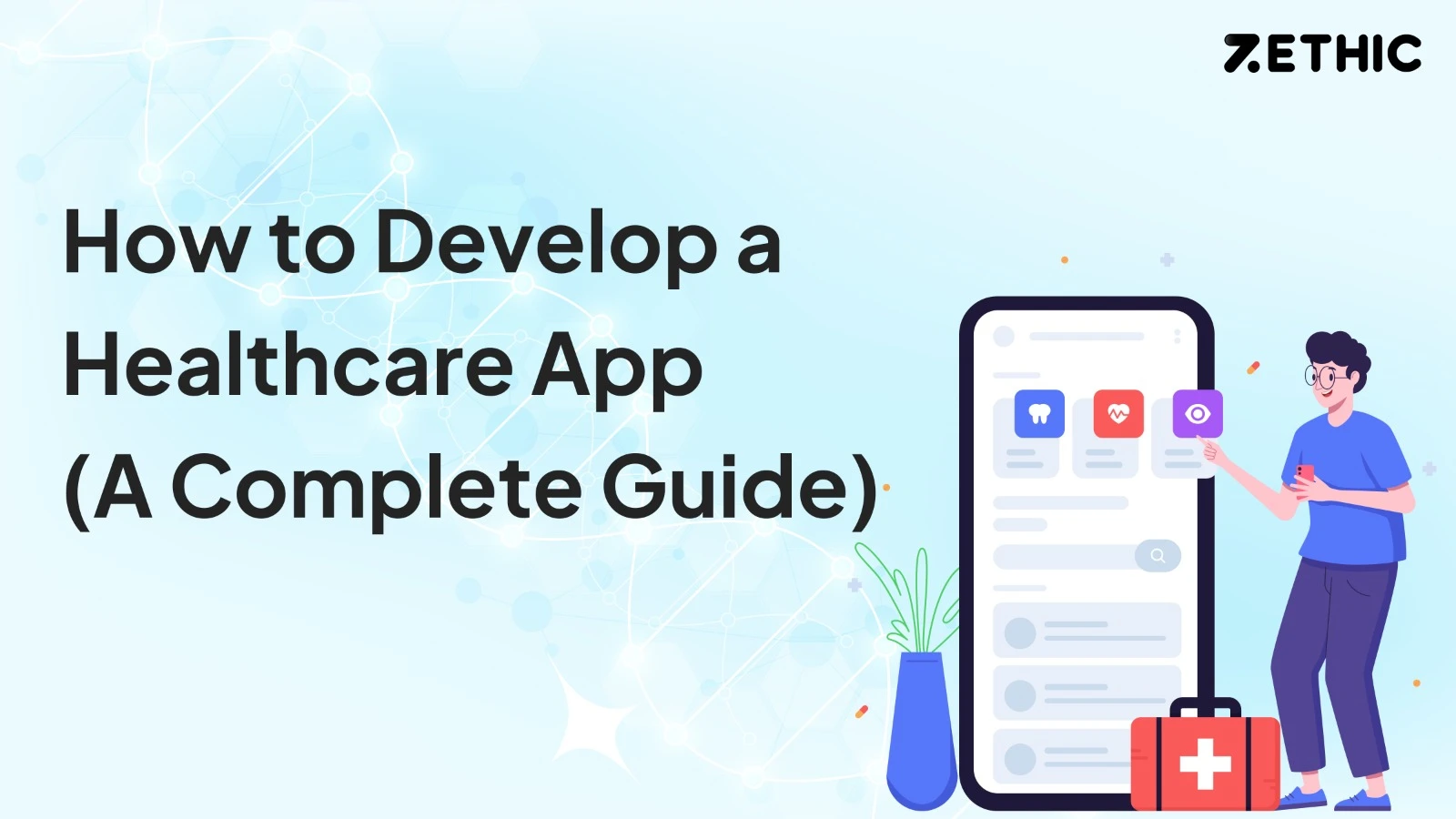Embarking on the journey of launching your mobile app startup is an exhilarating endeavour, especially in an era where mobile apps have seamlessly woven into the fabric of our daily lives.
As an entrepreneur with a vision for innovation, bringing your app idea to life presents a unique opportunity to meet user needs and carve a niche in the thriving app market.
This guide on Starting a Successful business with an app will be your trusted companion, helping you from idea validation to scaling up your app.
I have an app idea: where do I start? Let’s delve into How to Start a Business with an App that survives and thrives in the competitive digital landscape.
Table of Contents
Steps to Start a Business with an App

1. Idea Validation: From Ideation to Strategic Reflection
Before diving into how to start a business with an app process, validating your app idea to ensure its viability and potential success is essential. Start by brainstorming and ideating multiple ideas, noting their feasibility and impact. Consider the pain points your app aims to solve and how it differentiates itself from existing solutions.
To validate your idea, seek feedback from industry experts and potential users. A product discovery workshop with mobile app consultants can help you assess the validity of your concept. Additionally, conduct surveys to understand your target audience’s needs and preferences. Idea validation is crucial to ensure your app idea solves a real problem and has market potential.
2. In-Depth Market Research: Navigating Your Target Landscape
Market research is vital in starting a business with an app. Thoroughly analyze your target market, competition, and potential customer base. Understand the pain points your competitors’ apps address and identify areas for improvement.
Study successful apps in your niche and learn their strengths and weaknesses. Explore failed apps and understand the reasons behind their lack of success. This research will help you position your app uniquely in the market and differentiate it from the competition.
Identify your target audience and conduct surveys to understand their preferences, behaviours, and demographics. Understanding your audience will help you tailor your app to their needs and improve user engagement.
3. Platform Selection: Choosing the Ideal Launch Pad
Choosing the right platform for starting a business with an Android, iOS, or both app requires considering factors such as market share, revenue potential, and target audience.
Analyze the app stores’ market share and user base for both Android and iOS. Understand the number of downloads and revenue models for each platform. Select the platform that aligns with your business goals and offers the most potential for reaching your target audience. Depending on your resources and app requirements, you may develop a native or hybrid app.
Read More: Advantage of Flutter App Development for Android & iOS Platform
4. Crafting a Seamless UI/UX Experience: Designing for Impact
UI/UX design plays a significant role in the success of a mobile app. Users expect visually appealing, intuitive, and functional applications. Design your app’s user interface (UI) to be visually appealing, on-brand, and in line with the latest design guidelines, such as Google Material Design or Apple’s Human Interface Guidelines.
Pay attention to the user experience (UX) to ensure your app is intuitive and easy to navigate. Conduct user testing and gather feedback to improve the app’s usability and address pain points. A well-designed UI/UX enhances user engagement, increases retention rates, and ultimately drives the success of your mobile app startup.
5. Product Development Prowess: Building Your Dream Team
The next step is assembling an app development team to jumpstart the development process. You have two options: hiring an in-house team or partnering with a remote team through outsourcing.
Consider your challenges and business needs when deciding between an in-house team and outsourcing. In-house teams provide faster communication and a better understanding of your product idea. On the other hand, outsourcing allows you to access highly skilled designers and developers.
Before you choose a company to develop your app, take your time to check them out. Look at the work they’ve done before, read about their past projects, and see what their clients say about them. Make sure the cost of developing your app fits your budget. And remember to sign a non-disclosure agreement to keep your app idea safe and sound.
Focus on delivering a delightful user experience and building a minimum viable product (MVP) that addresses core pain points. Gain feedback from users and gradually incorporate additional features based on their needs and preferences.
Read More: Mobile App Development Cost in 2024
6. Funding Strategies: Fueling Your App Startup Journey
To fuel your mobile app startup, you may need to secure funding. Generating sufficient funds provides resource availability and increases the chances of success. Various funding options are available, depending on your business model and goals.
Consider fundraising options such as seed funding, bootstrapping, crowdfunding, or initial coin offerings (ICOs). Craft an elevator pitch to attract potential investors and showcase your app’s unique value. Build a network of potential investors, and leverage your business plan to demonstrate the growth potential of your app startup.
7. Strategic Marketing Blueprint: Unveiling Your App to the World
Marketing is a crucial aspect of app startup success. Develop a strategic marketing plan to generate traction and reach your target audience. Leverage social media platforms, public relations, and other marketing channels to create buzz around your app.
Utilize social media platforms like Snapchat, Instagram, and PR strategies to gain market visibility and attract users. Implement effective mobile app marketing strategies, such as App Store Optimization (ASO), to improve your app’s discoverability. Craft captivating app listings, optimize keywords, and design visually appealing screenshots to drive downloads.
8. Monetization Mastery: Laying the Foundation for Revenue
Decide on a monetization strategy for your mobile app startup early on. There are several options, such as advertising, sponsorship, in-app purchases, subscriptions, and pay-per-download.
Evaluate the pros and cons of each monetization model and choose the one that aligns with your app’s target audience and business goals. Research how similar apps in your niche monetize their offerings and identify opportunities to improve existing models.
9. Continuous Enhancement: Updating and Improving Your Application
Your mobile app’s journey does not end with its launch. Regularly update and improve your app to enhance user experience, address bugs, and introduce new features. Actively listen to user feedback and incorporate their suggestions into future updates.
Maintain a strong focus on user retention by providing a seamless experience and addressing user pain points. Regular maintenance, updates, and new functionality are essential for the long-term success of your app startup. Additionally, consider the potential for pivoting your startup based on market feedback and changing trends.
10. Retention Tactics: Keeping Your Users Engaged
Retaining app users is as crucial as acquiring new ones. With numerous similar apps, user retention strategies are essential for long-term success. Consider the following tips for retaining your app users:
- Plan notification timing carefully to avoid user annoyance.
- Be transparent about data collection and usage to build trust with users.
- Avoid unnecessary updates and only release them when necessary to minimize disruption.
- Optimize the user experience and leverage user feedback to improve your app.
Retaining users requires a holistic approach that combines excellent user experience, continuous improvement, and providing value to your users.
Conclusion
In conclusion, starting a mobile app business requires a well-defined strategy, thorough market research, and a focus on user experience. Validate your app idea, conduct detailed market research, and choose the ideal platform for your target audience. Design an impeccable UI/UX and assemble an app development team that aligns with your goals and budget.
Secure funding for your app startup and create a strategic marketing plan to generate buzz and attract users. Have a monetization plan and continuously update and improve your app based on user feedback. Implement app retention strategies to keep your users engaged and satisfied.
At Zethic, a leading mobile app development company in Bangalore, we have the expertise and experience to help you bring your app startup to life. Our dedicated designers and developers can turn your idea into a successful mobile app. Contact us today to discuss how we can assist you in transforming your app startup into a reality.




